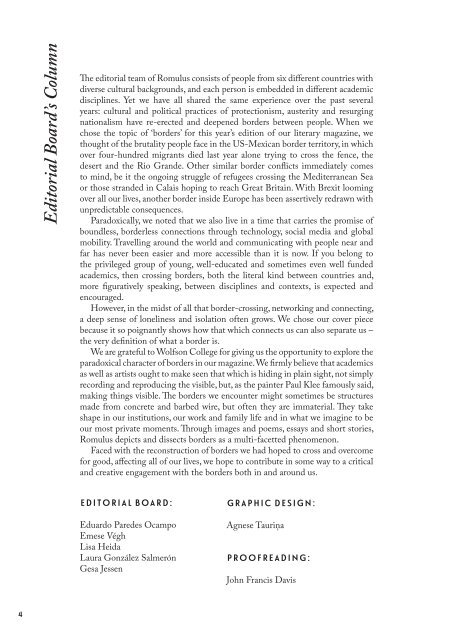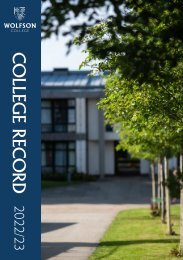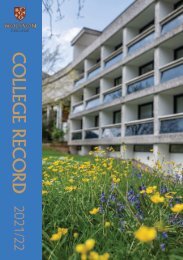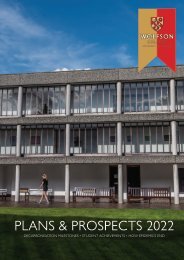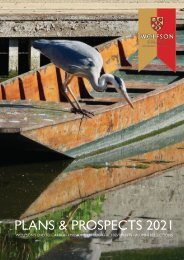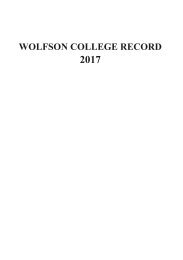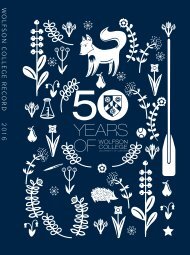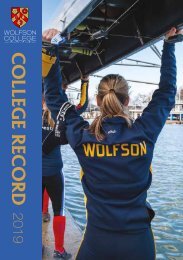Romulus 2018
Wolfson's Literary magazine Romulus
Wolfson's Literary magazine Romulus
- No tags were found...
Create successful ePaper yourself
Turn your PDF publications into a flip-book with our unique Google optimized e-Paper software.
Editorial Board’s Column<br />
The editorial team of <strong>Romulus</strong> consists of people from six different countries with<br />
diverse cultural backgrounds, and each person is embedded in different academic<br />
disciplines. Yet we have all shared the same experience over the past several<br />
years: cultural and political practices of protectionism, austerity and resurging<br />
nationalism have re-erected and deepened borders between people. When we<br />
chose the topic of ‘borders’ for this year’s edition of our literary magazine, we<br />
thought of the brutality people face in the US-Mexican border territory, in which<br />
over four-hundred migrants died last year alone trying to cross the fence, the<br />
desert and the Rio Grande. Other similar border conflicts immediately comes<br />
to mind, be it the ongoing struggle of refugees crossing the Mediterranean Sea<br />
or those stranded in Calais hoping to reach Great Britain. With Brexit looming<br />
over all our lives, another border inside Europe has been assertively redrawn with<br />
unpredictable consequences.<br />
Paradoxically, we noted that we also live in a time that carries the promise of<br />
boundless, borderless connections through technology, social media and global<br />
mobility. Travelling around the world and communicating with people near and<br />
far has never been easier and more accessible than it is now. If you belong to<br />
the privileged group of young, well-educated and sometimes even well funded<br />
academics, then crossing borders, both the literal kind between countries and,<br />
more figuratively speaking, between disciplines and contexts, is expected and<br />
encouraged.<br />
However, in the midst of all that border-crossing, networking and connecting,<br />
a deep sense of loneliness and isolation often grows. We chose our cover piece<br />
because it so poignantly shows how that which connects us can also separate us –<br />
the very definition of what a border is.<br />
We are grateful to Wolfson College for giving us the opportunity to explore the<br />
paradoxical character of borders in our magazine. We firmly believe that academics<br />
as well as artists ought to make seen that which is hiding in plain sight, not simply<br />
recording and reproducing the visible, but, as the painter Paul Klee famously said,<br />
making things visible. The borders we encounter might sometimes be structures<br />
made from concrete and barbed wire, but often they are immaterial. They take<br />
shape in our institutions, our work and family life and in what we imagine to be<br />
our most private moments. Through images and poems, essays and short stories,<br />
<strong>Romulus</strong> depicts and dissects borders as a multi-facetted phenomenon.<br />
Faced with the reconstruction of borders we had hoped to cross and overcome<br />
for good, affecting all of our lives, we hope to contribute in some way to a critical<br />
and creative engagement with the borders both in and around us.<br />
Lorenzo Petralia, ‘Dreaming Barbwire’<br />
EDITORIAL BOARD:<br />
Eduardo Paredes Ocampo<br />
Emese Végh<br />
Lisa Heida<br />
Laura González Salmerón<br />
Gesa Jessen<br />
GRAPHIC DESIGN:<br />
Agnese Tauriņa<br />
PROOFREADING:<br />
John Francis Davis<br />
4 5


